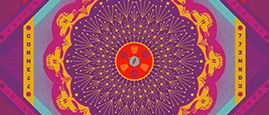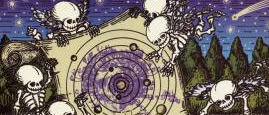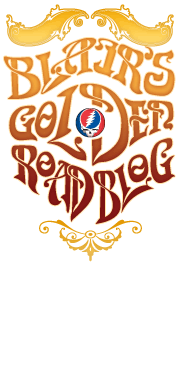Ticketmasters: The Rise of the Concert Industry and How the Public Got Scalped (ECW Press) is a fascinating and informative book that explains in exhaustive detail how the concert business — and particularly the ticketing side of it — got to its current infuriating state. Is there anybody out there who doesn’t hate ticket companies (Ticketmaster — or “Ticketbastard,” as folks have been calling it for years — being the prime offender), who doesn’t feel cheated and debased every time you buy a ticket? Service fees, facility fees, processing fees, print-at-home fees, hidden parking fees… Suddenly what looked like a bargain ticket for $25 can cost up to 40 bucks! And that’s a cheap show! It’s all spiraled completely out of control over the past couple of decades, and as mere consumers—the people supporting the acts we want to see—we are seemingly powerless to do anything about it. And, of course, the deeper you go you learn it isn’t just the ticketing companies—it’s the promoters, facilities, management companies and bands, too!
Clearly and engagingly written by Relix magazine executive editor Dean Budnick and editor-in-chief Josh Baron, Ticketmasters traces the history of modern ticketing from its humble mid-’60s origins with TRS (Ticket Reservation Systems) and its pioneering work selling tickets for Broadway shows at stores equipped with clunky computer terminals, through the rise of various powerful (and now long gone) regional companies, the first real giant, Ticketron, that company’s long war with onetime upstart (and now despotic king) Ticketmaster, and how changes in the concert production landscape affected ticket prices. Promoters cut deals with the ticket companies, venues cut deals with the ticket companies, bands wanted larger guarantees, big companies gobbled up smaller companies and fashioned exclusivity deals to crush their competition …the deals go on and on, layer upon layer, but it always ends up with higher prices for the fans.
The saga of the ascendancy of Robert F.X. Sillerman and his SFX Entertainment empire—which begat Clear Channel and then Live Nation, now merged with Ticketmaster—is a truly disturbing tale of corporate greed run amok; a modern-day de facto monopoly (venues! tickets! merch!) that has irrevocably altered the face of the touring industry, and not in a good way. (OK, so the Live Nation-Ticketmaster merger has so far survived antitrust investigations. It still feels wrong, and it puts too much power in the hands of too few. Of course, that’s the way this misguided country is headed in general.)
It’s an extremely complex story—a web of intrigue, back-biting, occasional good intentions, back-room deals and some out-and-out deceit. The authors take us into secret high-level meetings where deals were brokered, congressional hearings where our legislators preened and lectured and then usually decided nothing, and they methodically show us how the whole scandalous story evolved. Budnick and Baron are careful to let all the players speak their minds and tell their side of each story, and the writers generally steer clear of making critical judgments about the various episodes they recount. They were our eyes and ears as the story unfolds —always seeking to uncover more information about the inner workings of the maddening and mysterious industry. There might be more detail in this book than some people need, but I found it quite gripping and not without humor—after all, with all these blustering, over-amped, type-A personalities battling each other, there’s going to be a certain level of pathetic buffoonery.
Budnick and Baron are both fans of the Grateful Dead, and they devote a marvelous chapter to the Dead’s long history handling much of their own ticketing. Titled “A Bunch of Wooly Freaks,” after Bob Weir’s description of the good hippies over at GDTS (Grateful Dead Ticket Sales), the chapter describes how the organization grew to be so efficient yet stay so humane, the actual mechanics of the operation, some of the colorful folks who populated the staff (lots of Dead “family”), and their own giant battle with Ticketmaster, which was upset that the Dead routinely asked for and got 50 percent of the tickets for their gigs to sell themselves. Ticketmaster said this violated contracts they had with certain facilities and promoters (true) and that it would set a terrible precedent if allowed to continue. But in the end, after a heated meeting dominated by Ticketmaster’s Evil Emperor, Fred Rosen, and the Dead’s sharp legal eagle, Hal Kant, the Dead emerged mostly victorious — they did agree to allow Ticketmaster to maintain a larger percentage of tickets for stadium and amphitheater shows, but held onto their 50 percent for the other concerts. Yay!

The “Dead exception” that Ticketmaster agreed to (in part because the Dead were such a reliable and successful client year after year), led to other imbroglios. In 1995, Pearl Jam, who a year earlier had been unsuccessful negotiating with Ticketmaster for more fan-friendly ticketing, decided to try to mount their own tour completely outside of venues that had deals with Ticketmaster (i.e., most of the big ones). The band patched together an odd schedule of motley venues, but eventually it unraveled mid-tour. Publicly the band laid most of the blame on the difficulties of working outside the system, but Budnick and Baron reveal that the main problem with the tour stemmed from Pearl Jam lead singer Eddie Vedder’s complex physical and emotional issues, and were only partially related to the group's public battle with Ticketmaster. Still, the Pearl Jam fight is part of what led to the first congressional hearings on Ticketmaster’s alleged monopoly over ticketing, and it is an instructive cautionary tale of what usually happens when David battles Goliath. Another episode, involving String Cheese Incident, turns out much better.
The book deals in depth with the issue of fan club ticket allotments, the rise of VIP ticket packages and the battle against scalpers—and the disgraceful legal scalping that is epidemic now through numerous resale websites, including Ticketmaster’s own! It ends darkly by touching on the latest threat to low ticket costs: so-called “dynamic pricing.” This scam has already burned me a few times in my attempts to buy tickets for San Francisco Giants games: Prices (usually) rise as game day approaches, to the point where I paid $31 for standing room at one game, through the team’s site, not Stubhub or other scalp sites. Two years ago, a standing room ticket was $11 and remained at that price until game time.
Don’t get me started! I’ve got a lifetime of good and bad ticket experiences behind me, and I’ll get into a few of those next week. For now, though, if you have any tales you’d like tell about tix, the floor is officially open…
dead comment
ticketmaster sucks donkeys yes
i read bout this a while
Ticketmaster and U2
GDTS
small change
ticket bastard
Outlets like Stub Hub
same as it ever was
Tickets for my first dead show
manatarms...
the good old days
retina imprint
Ticketmaster does suck
I bought...
sounds good
My standing-in-line successes
I've purchased hundreds of
we were talking over on FB
Ticket Nazi!!
I liked the scalpers' strategy with the lottery
Ticketmasters.Ticketbastard
Bill Graham/Ticketmaster
Oh, man...
I thought it was "Sales" but presumed the authors had gotten it right! Oh, well. Steve, I thought you came off very well in the book. As did all the Dead folks...
I've fixed it now...
Europe 72 boxed set
collateral damage
silly boy
Jonapi...
I pay to see Jackie Greene because I like his music a whole lot I and want to support his art. He does not sell many albums (almost no one does anymore) so performing live is how he survives. I will pay a Ticketmaster fee because I want to see him at the Fillmore, which has a deal with Ticketmaster, and is a great place to see anyone. I could zip across the Bay Bridge and buy tickets at the Fillmore box office and save some (not all) charges, but between time getting over there, gas and toll, I wouldn't save much, and buying online, odious tough it may be, leaves a smaller carbon footprint than me driving to SF.
I'm not going to punish myself by not going. But I am more seelctive about what I go to, certainly.








